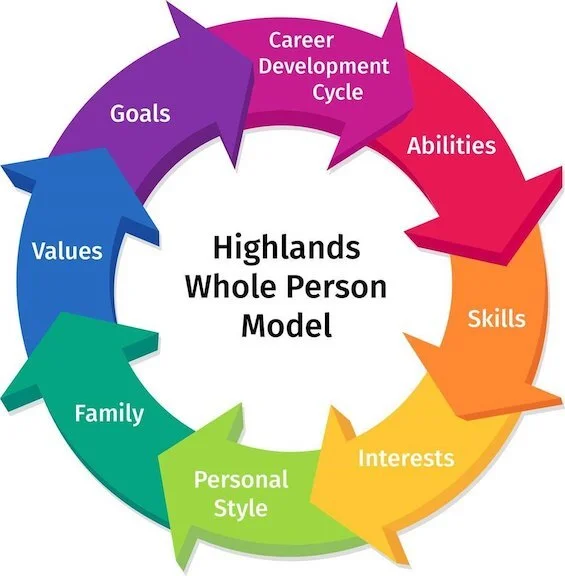WHAT ARE NATURAL ABILITIES, AND WHY DO THEY MATTER?
We don't think about our natural abilities because they come naturally to us, but they are critical in informing what types of work are best suited to us. At Quo Vadis Consulting, we consider many different factors (interests, values, stage of life, skills) to help you chart your course, but we start with your natural abilities. Skills are learned, education is acquired, but natural abilities comes hard-wired in us. Hence your score on the Highlands Ability Battery (HAB), the gold standard for abilities tests, will likely not vary much whether you take it at age 15 or 65. Every occupation uses certain abilities and not others, whether that be law, medicine, engineering, or sales. We find greater success and satisfaction when our jobs employ the abilities we do possess versus demand ones we lack. Our abilities do not take the place of the education and training we need to become skilled at what we do. They make the acquisition of those skills easier or harder. So why sail against the wind, when we can sail with it?
ABILITIES VERSUS SKILLS, INTELLIGENCE, & EDUCATION
Drumming, graphic design, surgery, and plumbing are examples of skills that require time, effort, and energy to learn. With enough time, effort, and energy, we can acquire all sorts of different skills. Our abilities, however, inform which of these skills may come easier for us. So as much as possible, we want to work with our abilities, not against them.
Abilities should not to be confused with intelligence or education. The only work sample on the HAB that tests achievement is vocabulary. All the other work samples test inborn, hard-wired abilities and personal styles. How well or poorly you do in school, or how successful or unsuccessful you are in your job, are not necessarily predictive of your natural abilities. In fact, it's the other way around: your natural abilities are more predictive of how easily some studies and jobs will come to you over others. The HAB will not tell you how "smart" you are. It will help you to make smarter choices for your future.
ABILITIES AND THE WHOLE PERSON MODEL
Your abilities are a very important part of who you are, but you are far more than your abilities. You must also give thought to your unique interests: What types of articles do you always stop and read? What makes time fly for you? Even if you have the ability profile for law, if you have no interest in jurisprudence, you may want to explore other careers that match both your ability profile and your interests. In fact, in our experience, interests are as important as natural abilities when it comes to loving what you do.
Your values are also critical: What is important to you? Family? Money? Faith? If you have both the ability profile and a strong interest in investment banking, but quality family time is a strong value, you will want to take it into consideration when surveying career and job options. Life stage is an obvious factor to be considered: A college freshman and a middle-aged adult may both be seeking direction but will have different choices before them. Also of note are any skills you have already acquired. If you are already a nurse, you want to take into consideration your hard-earned nursing skills when deciding on your next direction in life.
You are a unique and complex person, and only you can do the work to discover who you are. When you lay down the groundwork of self-discovery and self-reflection, you will be able to better see the way ahead that is the right one for you.
IMAGE COURTESY OF THE HIGHLANDS COMPANY


